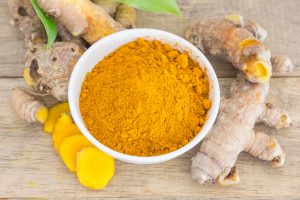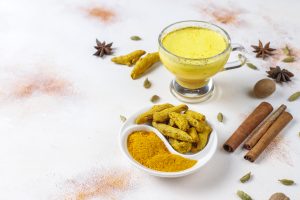is a bright yellow spice that has been a staple in Middle Eastern and Indian cooking for hundreds of years. It contains a powerful compound called curcumin, which is known for its numerous health benefits. Curcumin has the ability to transform the body and is packed with nutritional value. In addition to adding flavor and color to dishes, turmeric also enhances the nutritional content of meals, making it truly impressive. Its wide range of nutrients and unique qualities have earned it the title of “wonder spice.”
What is Turmeric?
Turmeric is a plant that belongs to the ginger family. It originates from India and the Southeast Asia region, where it was used in traditional medicine for centuries. The plant grows tall, up to 3 feet, and has a thick, savory root, which is used to make the spice. The flowers of the plant are yellow.
What is curcumin?
Curcumin is the active compound found in turmeric. It is a polyphenol that has powerful anti-inflammatory and antioxidant traits. Curcumin is responsible for the yellow color of turmeric and is extracted from the root of the plant.
Health Benefits of Turmeric

Turmeric has been shown to have numerous health benefits, including:
1. Reducing inflammation
Curcumin, the active compound in turmeric, has potent antiinflammatory properties. This means it can help reduce inflammation in the body and alleviate symptoms associated with conditions such as arthritis. Inflammation is a natural response of the body to injury or infection, but chronic inflammation can lead to various health problems. By incorporating turmeric into your diet, you may be able to manage inflammation and improve your overall well-being.
2. Improving cognitive function
Research suggests that turmeric may have positive effects on cognitive function and brain health. Studies have shown that curcumin can cross the blood-brain barrier and exert beneficial effects on neurons. This has led to the belief that turmeric may help improve memory, attention, and overall cognitive performance. Additionally, some studies indicate that regular consumption of turmeric may reduce the risk of neurodegenerative diseases such as Alzheimer’s and Parkinson’s.
3. Supporting overall wellness
Turmeric is known for its antioxidant and anti-inflammatory properties. Antioxidants are compounds that protect the body from oxidative stress caused by free radicals, which can damage cells and contribute to chronic diseases. By reducing oxidative stress and inflammation, turmeric may help support overall wellness and lower the risk of conditions such as heart disease, diabetes, and certain cancers.
4. Reducing cancer risk
Several studies have explored the potential anti-cancer effects of curcumin. While more research is needed in this area, preliminary findings suggest that turmeric may help inhibit the growth of cancer cells and prevent the spread of tumors. This has led to interest in using curcumin as a complementary therapy for certain types of cancer. However, it’s important to note that turmeric should not be considered a substitute for conventional cancer treatment.
5. Improving heart health
Heart disease is a leading cause of death worldwide, but certain lifestyle changes can significantly reduce the risk. Turmeric’s anti-inflammatory properties may play a role in promoting heart health by reducing inflammation in blood vessels and improving endothelial function (the lining of blood vessels). Some studies have also suggested that curcumin may help lower cholesterol levels and improve blood lipid profiles.
Incorporating Turmeric into Your Diet
If you’re interested in reaping the health benefits of turmeric, here are some simple ways to incorporate it into your diet:
- Add it to curries, soups, or stews for an extra flavor boost.
- Mix it into smoothies or juices for a nutritious kick.
- Use it as a seasoning for roasted vegetables or grilled meats.
- Brew turmeric tea by steeping fresh or dried turmeric root in hot water.
Remember that curcumin is not easily absorbed by the body on its own, so pairing turmeric with black pepper (which contains piperine) or healthy fats (such as coconut oil) can enhance its absorption.
As always, it’s best to consult with a healthcare professional before making any significant changes to your diet or lifestyle, especially if you have existing health conditions or are taking medications.Copy

How to Use Turmeric
Turmeric can be used in a variety of ways, including:
Cooking
Turmeric can be added to food while cooking to give it a yellow color and a slightly bitter flavor. It works well in curries, soups, stews, and rice dishes. You can also use it to season roasted vegetables or add it to smoothies for an extra health boost.
Supplements
If you find it challenging to incorporate enough turmeric into your diet, you may consider taking turmeric supplements. These are available in capsule or powder form and can be taken orally. It’s essential to follow the recommended dosage on the packaging or consult with a healthcare professional for guidance.
Topical application
Turmeric has anti-inflammatory properties that can benefit skin. You can create a turmeric paste by mixing turmeric powder with water or coconut oil and applying it directly to the affected area. Leave it on for about 30 minutes before washing. This method may help reduce redness and swelling and promote healing for conditions like acne or eczema.
Turmeric Dosage and Precautions
The recommended dosage of turmeric varies depending on the individual and the specific health concern being addressed. Here are some general guidelines:
Cooking
When using turmeric in cooking, aim for 1/2 to 1 teaspoon of turmeric powder per day. This amount should be sufficient to enjoy its potential health benefits while adding flavor to your meals.
Supplements
For those who opt for turmeric supplements, studies suggest a dosage range of 500 to 2000 mg of curcumin per day. Curcumin is the active compound in turmeric responsible for its therapeutic effects. It’s advisable to start with a lower dose and gradually increase it as needed, but always consult with a healthcare professional before making any significant changes.
Topical application
When applying turmeric topically, it’s best to do a patch test first to check for any allergic reactions. Apply a small amount of turmeric paste or oil to a small area of skin and wait 24 hours. If there’s no adverse reaction, you can proceed with applying it to the affected area as needed.
Note: Turmeric may stain clothing and surfaces, so be cautious when handling it. Additionally, individuals with certain medical conditions or those taking specific medications should consult their doctor before using turmeric in large amounts or as a supplement.
Turmeric is generally considered safe to use, but it can cause some side effects, including:
Stomach upset: Turmeric can cause stomach upset, including nausea and diarrhea.
Allergic reactions: Some individuals may be allergic to turmeric and experience symptoms such as hives and itching.
Conclusion
Turmeric is a powerful spice that has been used for centuries for its medicinal properties. The active compound curcumin, found in turmeric, has strong antioxidant and anti-inflammatory properties, which can help reduce inflammation, improve cognitive function, and support overall wellness.
Whether you use turmeric in cooking, take it as a supplement, or apply it topically to the skin, this wonder spice is sure to provide numerous health benefits.

